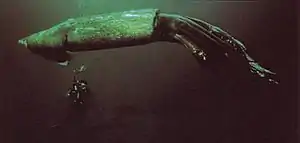Onykia robusta
Onykia robusta, also known as the robust clubhook squid and often cited by the older name Moroteuthis robusta,[3][4][5][6][7] is a species of squid in the family Onychoteuthidae. Reaching a mantle length of 2 m (6.6 ft),[8] it is the largest member of its family and one of the largest of all cephalopods. The tentacular clubs are slender, containing 15–18 club hooks. Arms of the species contain 50–60 suckers, and grow to 90–100% of the mantle length. It is found primarily in the boreal to Temperate Northern Pacific.
| Robust clubhook squid | |
|---|---|
 | |
| Scientific classification | |
| Domain: | Eukaryota |
| Kingdom: | Animalia |
| Phylum: | Mollusca |
| Class: | Cephalopoda |
| Order: | Oegopsida |
| Family: | Onychoteuthidae |
| Genus: | Onykia |
| Species: | O. robusta |
| Binomial name | |
| Onykia robusta | |
| Synonyms | |
| |
Confusion with Architeuthis

Some time before 1993, a large individual of O. robusta was photographed by Japanese diver Kubota H.[8] in shallow water off southern Japan.[9] In this image, the animal, which appears to be sick or dying, is shown with a diver, although the use of a wide-angle lens exaggerates its size.[9] A video of the same squid appears in a Japanese made-for-television film.[9] The image was published in the 1993 book European Seashells by Guido T. Poppe and Goto Yoshihiro, where it was identified as Architeuthis dux, the giant squid, and said to have been taken in the North Atlantic.[10] If true, this image would represent the earliest known photograph of a live giant squid.[9]
In The Search for the Giant Squid (1998), Richard Ellis wrote of this photograph:[9]
"For a moment, I thought that some obscure photograph had captured the most elusive image in natural history. Fortunately for those who have devoted their lives to searching for Architeuthis, this was only an aberration, a case of mistaken identity."
More than a decade later, the first photographs of a true live giant squid in the wild were taken, on September 30, 2004.[11]
See also
References
- Barratt, I.; Allcock, L. (2014). "Onykia robusta". IUCN Red List of Threatened Species. 2014: e.T163252A990102. doi:10.2305/IUCN.UK.2014-1.RLTS.T163252A990102.en. Retrieved 18 November 2021.
- Philippe Bouchet (2018). Bieler R, Bouchet P, Gofas S, Marshall B, Rosenberg G, La Perna R, Neubauer TA, Sartori AF, Schneider S, Vos C, ter Poorten JJ, Taylor J, Dijkstra H, Finn J, Bank R, Neubert E, Moretzsohn F, Faber M, Houart R, Picton B, Garcia-Alvarez O (eds.). "Onykia robusta (Verrill, 1876)". MolluscaBase. World Register of Marine Species. Retrieved 16 March 2018.
- Tsuchiya, K.; Okutani, T. (September 1991). "Growth Stages of Moroteuthis robusta (Verrill, 1881) with the Re-evaluation of the Genus". Bulletin of Marine Science. Rosenstiel School of Marine and Atmospheric Science. 49 (1–2): 137–147. Retrieved 2010-08-06.
- Wakabayashi, T.; Kubodera, T.; Sakai, M.; Ichii, T.; Chow, S. (2007). "Molecular evidence for synonymy of the genera Moroteuthis and Onykia and identification of their paralarvae from northern Hawaiian waters". Journal of the Marine Biological Association of the United Kingdom. 87 (4): 959–965. doi:10.1017/S0025315407056196. S2CID 51898681.
- Bolstad, Kathrin S. (2008-09-25), "Systematics of the Onychoteuthidae Gray, 1847 (Cephalopoda: Oegopsida)", Ph.D. Thesis, Auckland University of Technology, archived from the original on 2012-12-20, retrieved 2010-08-06
- Bolstad, K.S.R. 2010. Systematics of the Onychoteuthidae Gray, 1847 (Cephalopoda: Oegopsida). Zootaxa 2696: 1–186. Preview
- Vecchione, M., R.; Young, E.; Tsuchiya, K. (2009-11-29). "Onykia robusta (Verrill, 1876). Version 29 November 2009 (under construction)". The Tree of Life Web Project. Retrieved 2010-08-06.
{{cite web}}: External link in|work= - Norman, M.D. 2000. Cephalopods: A World Guide. ConchBooks.
- Ellis, R. 1998. The Search for the Giant Squid. The Lyons Press.
- Poppe, G.T. & Y. Goto. 1993. European Seashells. Hemmen.
- Kubodera, T. & K. Mori. 2005. Kubodera, Tsunemi; Mori, Kyoichi (2005). "First-ever observations of a live giant squid in the wild" (PDF). Proceedings of the Royal Society B: Biological Sciences. 272 (1581): 2583–2586. doi:10.1098/rspb.2005.3158. PMC 1559985. PMID 16321779. Proceedings of the Royal Society B: Biological Sciences, 272(1581):2583–2586.
- Chambers, S. 2008. It’s a sea monster! (Sort of). The World Link, June 3, 2008.
- Third-largest cephalopod. Siuslaw News, August 4, 2008.
